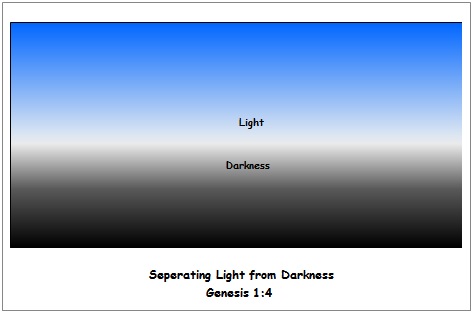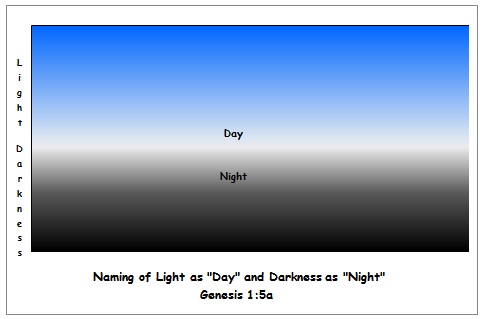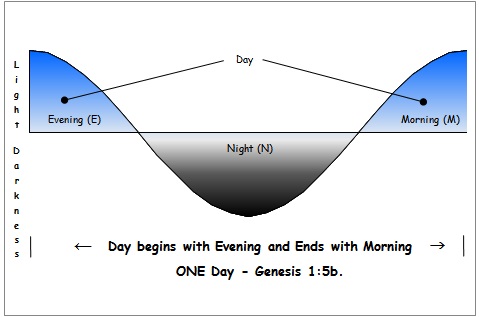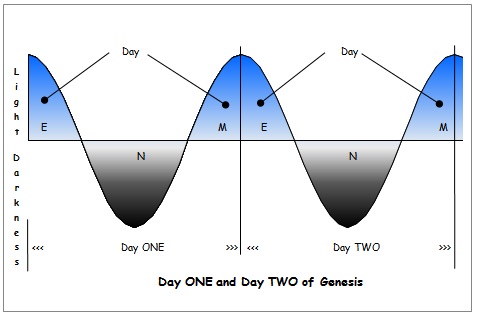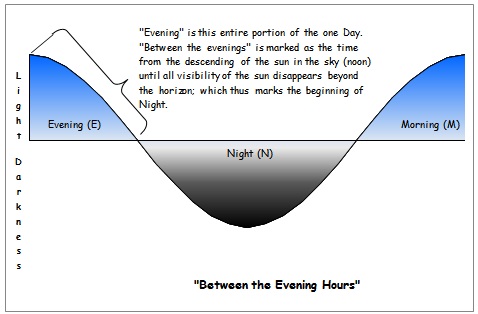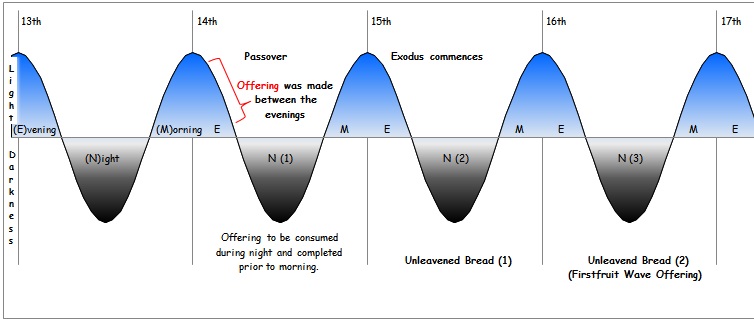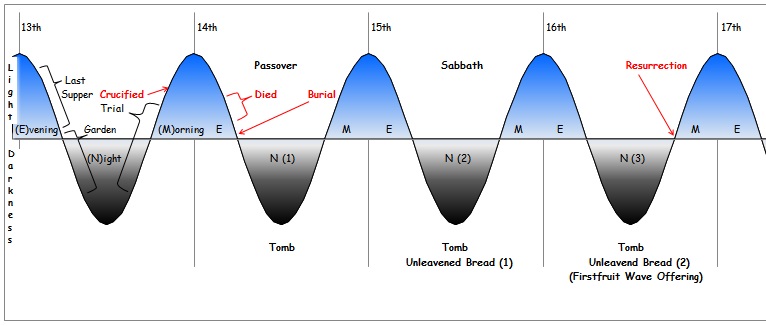Clarification on Terms
My definitions for clarification.
- Evening: The period of the Sun descending toward the horizon to set.
- Sunset: The exact time the Sun is no longer visible above the horizon.
- Evening Twilight: The period of decreasing light between Sunset and Dusk.
- Dusk: The exact time all sunlight is no longer visible in the western sky.
- Night: The period without the Sun's light in the sky.
- Dawn: Exact time sunlight becomes indirectly visible in the eastern sky.
- Morning Twilight: The period of increasing light between Dawn and Sunrise.
- Sunrise: The exact time the Sun is visible above the horizon.
- Daylight (a.k.a day): The period of the Sun's direct light in the sky.
- Calendar Day (a.k.a. day): The period measuring a calendar day, which is what is under discussion.
Presuppositions Matter
I will stick with pre-Babylonian texts. However, note that I hold:
- the Pentateuch as essentially completed at the time of Israel entering Canaan under Joshua (some updating of terms may apply)
- The book of Job to be early
NOTE: All English translations from NKJV.
Hebrew "Evening"
The purpose here is to identify usage of Hebrew terms in relation to my terminology above.
Evening (עֶ֫רֶב) is used five ways
Evening (עֶ֫רֶב) as pre-sunset
Dt 23:11 shows evening used for the period prior to sunset (see also Lev 22:6-7):
But it shall be, when evening comes [לִפְנֽוֹת־עֶ֖רֶב], that he shall wash with water; and when the sun sets [הַשֶּׁ֔מֶשׁ יָבֹ֖א], he may come into the camp.
Jer 6:4-5 shows a progression of time, from a noon call, to a lament that the daylight shadows are lengthening at evening (Sun is still up), to a new call to go by night (Sun is set).
"Prepare war against her; Arise, and let us go up at noon [צָהֳרַיִם]. Woe to us, for the day [יוֹם] goes away, For the shadows of the evening [עֶ֫רֶב] are lengthening. Arise, and let us go by night [לַ֫יְלָה], And let us destroy her palaces.”
Evening (עֶ֫רֶב) as the start of twilight, i.e. sundown
Josh 8:29 uses evening as a reference to a time that begins as the Sun goes down. Now, this idea of the Sun going down could be descending in the sky (still day, prior to twilight, just as #1), or descending below the horizon (sunset at twilight). I believe the reference here refers to the latter.
And the king of Ai he hanged on a tree until evening [עַד־עֵ֣ת הָעָ֑רֶב; "until the time of the evening"]. And as soon as the sun was down [וּכְב֣וֹא הַשֶּׁמֶשׁ֩], Joshua commanded that they should take his corpse down from the tree, cast it at the entrance of the gate of the city, and raise over it a great heap of stones that remains to this day.
NOTE: Further support is (A) the perfect tense of בוא is used of the Sun having finished the process of going down and it then being dark. For example, Gen 15:12, Abraham falls asleep during the time the Sun is moving toward going down (הַשֶּׁ֙מֶשׁ֙ לָב֔וֹא), and then more occurs after the sun had gone down v.17 (הַשֶּׁ֙מֶשׁ֙ בָּ֔אָה); c.f. Gen 28:11, Lev 22:7 [as given above]). (B) The infinitive construct of בוא, as found in Josh 8:29, is used to refer to the sundown point.
Evening (עֶ֫רֶב) as dusk
Pro 7:8-10 shows the movement of a naive youth Solomon is observing in the twilight time and an evening point that belong to a day, to the actual meeting in the dark of night following:
8 Passing along the street near her corner; And he took the path to her house 9 In the twilight, in the evening [בְּנֶֽשֶׁף־בְּעֶ֥רֶב י֑וֹם], In the black and dark night [בְּאִישׁ֥וֹן לַ֝֗יְלָה וַאֲפֵלָֽה].
10 And there a woman met him...
It is possible that בְּנֶֽשֶׁף־בְּעֶ֥רֶב means simply "in the evening twilight," but נֶֽשֶׁף is in the absolute, not construct, and Hebrew modifiers typically are a construct form, so "in the twilight [construct] of the evening [absolute]" would be "in the evening twilight," where as here with the two absolutes, it likely names two points in time, closely related and specifically associated to the day (י֑וֹם), right before entering night. The order then is instructive, as the evening here is after twilight and before the night, so dusk. See also #5.
Evening (עֶ֫רֶב) as the whole night
Job 7:4 uses the term to refer to the whole of night
When I lie down, I say, ‘When shall I arise, And the night [evening; עֶ֫רֶב] be ended?’ For I have had my fill of tossing till dawn [(morning) twilight; נֶ֫שֶׁף].
Evening in the dual with preposition between (בֵּ֥ין הָעַרְבָּֽיִם) probably refers to twilight
The lexicons (BDB, HALOT) note the probability that the dual form with this preposition refers to between the two evenings, which means in my terminology, between the #2 עֶ֫רֶב (sundown) and the #3 עֶ֫רֶב (dusk), i.e., evening twilight.
Twilight (נֶ֫שֶׁף) was used in either evening or morning relation
The Pro 7:8-10 and Job 7:4 passages above show examples of evening and morning twilight (נֶ֫שֶׁף) respectively. The term had flexibility, just as the English word twilight.
Hebrew's Definition of Calendar Day found in the Passover Passages
Passover
Exodus 12:1-51 (Key verses only; some non-timing verses elided)
... 2 “This month shall be your beginning of months; it shall be the first month of the year to you. 3 Speak to all the congregation of Israel, saying: ‘On the tenth of this month every man shall take for himself a lamb, according to the house of his father, a lamb for a household.... 6 Now you shall keep it until [עַד] the fourteenth day of the same month. Then the whole assembly of the congregation of Israel shall kill it at twilight [בֵּ֥ין הָעַרְבָּֽיִם, "between the evenings"].
COMMENT: The עַד can mean until as in up to the point of (i.e., right as the 14th day starts, it is killed) or it can mean until as in as long as (i.e., through the 14th day, but not to exceed it). The point here is that on the 14th the lamb must be killed, whichever the case for עַד.
7 And they shall take some of the blood and put it on the two doorposts and on the lintel of the houses where they eat it. 8 Then they shall eat the flesh on that night [בַּלַּ֣יְלָה הַזֶּ֑ה]; roasted in fire, with unleavened bread and with bitter herbs they shall eat it. ... 10 You shall let none of it remain until morning [עַד־בֹּ֑קֶר], and what remains of it until morning [עַד־בֹּ֖קֶר] you shall burn with fire. 11 And thus you shall eat it: with a belt on your waist, your sandals on your feet, and your staff in your hand. So you shall eat it in haste. It is the LORD’s Passover.
COMMENT: The eating of the lamb was at night, i.e. after evening as it was being sacrificed at evening, so it needed to be roasted first (roughly from 2.5 to 5 hours needed for that). But note (a) that they were to eat it while dressed for travel, and (b) the time of the eating of it is the Passover (i.e. at night), because (cont.)
12 ‘For I will pass through the land of Egypt on that night [לַּ֣יְלָה], and will strike all the firstborn in the land of Egypt, both man and beast; and against all the gods of Egypt I will execute judgment: I am the LORD. ...
(cont.) the Passover meal observance is commemorating the night that God passed over Egypt and killed the firstborn that were not covered by the blood. So the Passover is at night.
14 ‘So this day [הַיּ֨וֹם] shall be to you a memorial; and you shall keep it as a feast to the LORD throughout your generations. ...
COMMENT: This passage is declaring a "day"to be a memorial. The day the lamb was sacrificed? The day it was eaten? Or both (if it is the same day)? That relates to the overall question here.
15 Seven days you shall eat unleavened bread. On the first day [בַּיּ֣וֹם הָרִאשׁ֔וֹן] you shall remove leaven from your houses. For whoever eats leavened bread from the first day until the seventh day, that person shall be cut off from Israel. 16 On the first day [בַּיּ֣וֹם הָרִאשׁ֔וֹן] there shall be a holy convocation, and on the seventh day there shall be a holy convocation for you. No manner of work shall be done on them; but that which everyone must eat—that only may be prepared by you. 17 So you shall observe the Feast of Unleavened Bread, for on this same day [הַיּ֣וֹם] I will have brought your armies out of the land of Egypt. Therefore you shall observe this day [הַיּ֥וֹם] throughout your generations as an everlasting ordinance. 18 In the first month, on the fourteenth day of the month at evening [בָּעֶ֔רֶב], you shall eat unleavened bread, until the twenty-first day of the month at evening [בָּעָֽרֶב].
COMMENT: Notice: (1) both the 1st and 7th day of the memorial are a "holy convocation" without work. This is the "high Sabbath" concept, a special Sabbath (v.15-16). (2) that this seven day span is The Feast of Unleavened Bread, beginning on the day God brought them out of Egypt (v.17). (3) a critical point in v.18, that one of the two "at evenings" mentioned cannot actually be considered part of one of the two numerical days mentioned (14th/21st) because then the command for not eating leaven would span for eight calendar days' time, not seven, as it would not be allowed on (portions of) the 14th, 15th, 16th, 17th, 18th, 19th, 20th, and 21st (= 8 days). This means either "at evening" on the 14th/21st is a term for the transition point to the 15th/22nd (the 7 days being 15th-21st) or "at evening" on the 14th/21st refers to the transition from the 13th/20th to the 14th/21st (7 days is 14th-20th). Significantly, whichever is intended, they both testify to a transition of numbering the days occurring at the evening period. (4) that the eating of the lamb would be in the night and unleavened bread was to be eaten with it, so the beginning of not eating leaven was in the night hours, and the night was part of the "days" in which no eating of leaven could occur, so we are talking about calendar days (not just daylight).
19 For seven days no leaven shall be found in your houses, since whoever eats what is leavened, that same person shall be cut off from the congregation of Israel, whether he is a stranger or a native of the land. ... 21 Then Moses called for all the elders of Israel and said to them, “Pick out and take lambs for yourselves according to your families, and kill the Passover lamb. 22 And you shall take a bunch of hyssop, dip it in the blood that is in the basin, and strike the lintel and the two doorposts with the blood that is in the basin. And none of you shall go out of the door of his house until morning [עַד־בֹּֽקֶר].
COMMENT: A reiteration of seven, not eight, days. The command was given to not go out "until morning."
23 For the LORD will pass through to strike the Egyptians; and when He sees the blood on the lintel and on the two doorposts, the LORD will pass over the door and not allow the destroyer to come into your houses to strike you. ... 27 that you shall say, ‘It is the Passover sacrifice of the LORD, who passed over the houses of the children of Israel in Egypt when He struck the Egyptians and delivered our households.’ ” So the people bowed their heads and worshiped. ... 29 And it came to pass at midnight [בַּחֲצִ֣י הַלַּ֗יְלָה] that the LORD struck all the firstborn in the land of Egypt, from the firstborn of Pharaoh who sat on his throne to the firstborn of the captive who was in the dungeon, and all the firstborn of livestock. 30 So Pharaoh rose in the night [לַ֗יְלָה], he, all his servants, and all the Egyptians; and there was a great cry in Egypt, for there was not a house where there was not one dead. 31 Then he called for Moses and Aaron by night [לַ֗יְלָה], and said, “Rise, go out from among my people, both you and the children of Israel. And go, serve the LORD as you have said. 32 Also take your flocks and your herds, as you have said, and be gone; and bless me also.” 33 And the Egyptians urged the people, that they might send them out of the land in haste. For they said, “We shall all be dead.” 34 So the people took their dough before it was leavened, having their kneading bowls bound up in their clothes on their shoulders.
COMMENT: Notice that Pharaoh calls for Israel to leave in the night, and there was an urging and hastening of the Egyptians to get the Israelites out.
... 37 Then the children of Israel journeyed from Rameses to Succoth, about six hundred thousand men on foot, besides children. ... 39 And they baked unleavened cakes of the dough which they had brought out of Egypt; for it was not leavened, because they were driven out of Egypt and could not wait, nor had they prepared provisions for themselves.
COMMENT: Note the reasoning for why the bread was not leavened; it was the haste they left in. The instructions for the future memorial of Passover required no leaven for seven days, but that was reflecting the experience of Israel because they left in haste.
... 42 It is a night [לַ֫יִל] of solemn observance to the LORD for bringing them out of the land of Egypt. This is that night [הֽוּא־הַלַּ֤יְלָה הַזֶּה֙] of the LORD, a solemn observance for all the children of Israel throughout their generations.
COMMENT: The Passover is an observance performed in the night.
... 46 In one house it shall be eaten; ... 51 And it came to pass, on that very same day, that the LORD brought the children of Israel out of the land of Egypt according to their armies.
COMMENT: The calendar day in which the Passover was eaten (i.e., in the night), is the same day Israel came out of Egypt.
Summary
What has been learned and what needs clarification thus far:
- Calendar days must transition in the evening, as that is the only explanation for the calendar date records given of the 14th-21st being able to account for 7 days of unleavened observance (v.15, 18-19); this fact alone answers the OP's question directly.
- But which is correct for the 7 days: 14th-20th or 15th-21st? Another passage below helps answer that.
- What is the evening point that is the actual transition to a new calendar day? prior to sundown? sundown? or dusk? or in the night itself (midnight, etc.)? The following point helps narrow the field.
- The Passover sacrifice for the night feast occurs between the evenings, which at the least refers to something prior to dusk and the night proper. That it had to be killed on the 14th is important to remember (v.6).
- The Passover feast is an observance occurring in the night (v.8).
- Israel was released in the night (i.e., early morning while still night, after the midnight slaying of the firstborn; v.31).
- Israel left the same calendar day as the Passover, first journeying from Rameses (v.37).
Numbers 33:3-4 Clarifies the Calendar Days
3 They departed from Rameses in the first month, on the fifteenth day of the first month; on the day after the Passover the children of Israel went out with boldness in the sight of all the Egyptians. 4 For the Egyptians were burying all their firstborn, whom the LORD had killed among them. Also on their gods the LORD had executed judgments
These reveal what Exodus 12 did not. In order to not be a contradiction, the "at evening" of Ex 12:18 had to refer to the very end of the evening of the 14th that transitions to the 15th, with the Feast of Unleavened Bread being the 15th up to the end of the evening of the 21st (right before it transitions to the 22nd). It must be this, because here in Numbers it clearly states they left Rameses on the 15th, which was the first departure point, and they departed the same calendar day as when they ate the feast (Ex 12:37). So here in Numbers 33:3, "the day after the Passover" is referring not to the calendar day after, but that they were departing during the daytime after the night of the feast and LORD's Passover of Egypt, during which daylight hours of the same day the Egyptians were burying the dead from the night before.
The above answers one of the remaining questions from the Exodus 12 passage, and helps to answer the second:
The Feast of Unleavened Bread is which Days?
- From Ex 12:18 a calendar date must transition in the evening
- The Passover sacrifice had to be on the 14th, for it was "until" then that they kept the lamb
- The Passover sacrifice had to be killed "between the evenings" (twilight), making twlight still the 14th.
- The first eating of unleavened bread occurred with the eating of that lamb in the night, which was the new calendar day
- Which new day was the 15th, as that was the date of the daylight time following after the Passover feast of the night
- So then the "at evening" of the 14th that started the 7 days of unleavened bread was the end of 14th/start of 15th transition point, making the feast from the 15th-21st up to the "at evening" of the 21st that would transition to the 22nd. This dating is confirmed elsewhere in the text (Lev 23:6-8; Num 28:17).
Actual Time of Transition to New Date?
From the Numbers 33 passage, a transition occurs from the 14th to the 15th sometime in relation to the night, because Israel ate the Passover in the night, which was also on the same day as they left Egypt, the 15th. The earliest the 15th could arrive is dusk (the start of night) because:
- The lamb had to be killed on the 14th.
- The lamb was killed "between the evenings" (at twilight), showing twilight was still 14th.
But when in the evening (per Exo 12:18) did the calendar date change? The evidence indicates dusk, not midnight or otherwise.
- The term evening (עֶ֫רֶב) very rarely is used to refer to the whole of night, for besides Job 7:4, there is no clear reference of it referring to the night proper; so that use may even be unique. The normal singular uses refer to periods of time pre-sunset, sundown, or dusk. All except dusk is ruled out based on the above two bullet points.
- Evening must point to a specific time for calendar date transition, so a general use for the whole night (like Job 7:4) cannot refer to a transition point. And there is no evidence at all that evening refers to some point within the midst of the night.
- In Exodus 12, the terms evening (עֶ֫רֶב; v.18) and night (לַ֗יְלָה; v.8, 12) are both used. If the transition occurred sometime in the midst of the night, then v.18 dating associations could have read: "In the first month, on the fourteenth day of the month at midnight, you shall eat unleavened bread, until the twenty-first day of the month at midnight." That is, the choice of "evening" appears intentional and distinct from the mentions of night or midnight (also distinguished in v.29).
- Other confirming evidences:
- Sundown was the time in which the 7th day ended during Samson's riddle (see Judges 14:12-18 discussion below).
- A day's wages were to be paid by sundown (Dt 24:15), indicating the reckoning of the day did not extend past dusk.
- David considered sundown the end of his day of mourning for Abner (2 Sam 3:35).
- Jeremiah refers to sundown during the day to make a premature reference to the ending of that day (Jer 15:9).
Therefore, the reader is left with no reason to doubt the transition of dates occurs "at evening," meaning dusk, the transition out of the twilight of the 14th to the night of the 15th, which is the day Israel left Rameses.
Note that the above information matches Wikipedia's Passover entry, a term for the Feast of Unleavened Bread (bold emphasis added):
Passover commences on the 15th of the Hebrew month of Nisan and lasts
for either seven days (in Israel) and for Reform Jews and other
progressive Jews around the world who adhere to the Biblical
commandment or eight days for Orthodox, Hasidic, and most Conservative
Jews (in the diaspora). In Judaism, a day commences at dusk and
lasts until the following dusk, thus the first day of Passover only
begins after dusk of the 14th of Nisan and ends at dusk of the 15th
day of the month of Nisan. The rituals unique to the Passover
celebrations commence with the Passover Seder when the 15th of Nisan
has begun.
Reading Deut 16:1-8
1 “Observe the month of Abib, and keep the Passover to the LORD your God, for in the month of Abib the LORD your God brought you out of Egypt by night [לַ֫יְלָה].
COMMENT: Note that Israel was "brought out" by night, because they originally began leaving sometime in the early morning hours of night after the command of Pharaoh was given.
2 Therefore you shall sacrifice the Passover to the LORD your God, from the flock and the herd, in the place where the LORD chooses to put His name.
3 You shall eat no leavened bread with it; seven days you shall eat unleavened bread with it, that is, the bread of affliction (for you came out of the land of Egypt in haste), that you may remember the day in which you came out of the land of Egypt all the days of your life.
COMMENT: Again we see the tie to why unleavened bread is eaten, because of the haste of leaving early that first day.
***
Now v.4 is my more literal translation of the Hebrew, because I believe the NKJV does not best reflect the terms in the Hebrew and showing how the verse meshes with the facts from the above verses. the Hebrew is:
וְלֹֽא־יֵרָאֶ֨ה לְךָ֥ שְׂאֹ֛ר בְּכָל־גְּבֻלְךָ֖ שִׁבְעַ֣ת יָמִ֑ים וְלֹא־יָלִ֣ין מִן־הַבָּשָׂ֗ר אֲשֶׁ֨ר תִּזְבַּ֥ח בָּעֶ֛רֶב בַּיּ֥וֹם הָרִאשׁ֖וֹן לַבֹּֽקֶר
4 And leaven shall not be seen among you in all your territory seven days, and there shall not remain overnight from the flesh that you sacrifice in the evening, in the first day to the morning.
COMMENT: The distinction of this translation is reflecting the Hebrew order in that the מִן־הַבָּשָׂ֗ר אֲשֶׁ֨ר תִּזְבַּ֥ח בָּעֶ֛רֶב is the subject of what is to not remain overnight, "from the flesh that you sacrifice in the evening" of the 14th, while the following בַּיּ֥וֹם הָרִאשׁ֖וֹן לַבֹּֽקֶר is an adverbial modifier to the overnight verb (וְלֹא־יָלִ֣ין) to not have it remain "in the first day to the morning" of the 15th, the first day of unleavened bread.
5 “You may not sacrifice the Passover within any of your gates which the LORD your God gives you; 6 but at the place where the LORD your God chooses to make His name abide, there you shall sacrifice the Passover at twilight [עֶ֫רֶב, not נֶ֫שֶׁף], at the going down of the sun, at the time [or assembly for?] you came out of Egypt.
COMMENT: First, translating עֶ֫רֶב as "twilight" is informed by Exodus 12, as to when in the evening the Passover sacrifice was made, and here clarifies Exodus 12's "between evenings" was "at the going down of the sun." Second, the final Hebrew phrase מוֹעֵ֖ד צֵֽאתְךָ֥ מִמִּצְרָֽיִם, which the NKJV translates as "at the time you came out of Egypt," does not match the time of the sacrifice and the going down of the sun. The Hebrew term מוֹעֵד can also mean "assembly meeting" (HALOT sees assembly as the primary meaning, whereas BDB ranks appointed time as primary; both recognize both possibilities). I think a better translation would be "at the assembly for you coming out of Egypt," meaning the place God chooses is where they assemble to do the sacrifice for commemorating their coming out of Egypt.
7 And you shall roast and eat it in the place which the LORD your God chooses, and in the morning you shall turn and go to your tents. 8 Six days you shall eat unleavened bread, and on the seventh day there shall be a sacred assembly to the LORD your God. You shall do no work on it.
Passover on the 14th
A few more passages note the Passover is on the 14th: Lev 23:5; Num 9:1–5, 28:16. These all are in reference to the sacrifice timing itself, as the first two note it is "between the evenings," which was the time for the sacrifice. In other words, it was still important to observe the sacrifice at the right time late on the 14th, so that the Passover meal itself could be on the night of the 15th.
A Few Select Confirmations
I'll just give two passages that also show that evening was the transition between calendar days.
Leviticus 23:26-32
This passage affirms what was learned in detail from the Passover study. The phrasing "at evening" on a numerical date, when it is referring to a transition to another numerical date (such as the Passover's 14th "at evening" transitioning to 15th), refers to the absolute end point of the date noted, and the beginning of the next date. So this passage is only saying that the Day of Atonement and the afflictions of it occur on the 10th day, not the 9th day at all, as the 9th is only in reference to "at evening" to indicate the whole day of the 10th is the Day of Atonement, from nightfall to the next nightfall.
26 And the LORD spoke to Moses, saying: 27 “Also the tenth day of this seventh month shall be the Day of Atonement. It shall be a holy convocation for you; you shall afflict your souls, and offer an offering made by fire to the LORD. 28 And you shall do no work on that same day, for it is the Day of Atonement, to make atonement for you before the LORD your God. 29 For any person who is not afflicted in soul on that same day shall be cut off from his people. 30 And any person who does any work on that same day, that person I will destroy from among his people. 31 You shall do no manner of work; it shall be a statute forever throughout your generations in all your dwellings. 32 It shall be to you a sabbath of solemn rest, and you shall afflict your souls; on the ninth day of the month at evening, from evening to evening, you shall celebrate your sabbath.”
The passage is clear that the 10th is the Day of Atonement, that it is the day of no work and affliction of the soul. The 9th "at evening" is the same type of reference to indicate the start of the 10th as the 14th was of the 15th for the Passover.
Judges 14:12-18
Here we see that the men had a deadline in which to answer the riddle of Samson. Seven days, the time of the feast, and they answered it at the last moment, in the evening, before a new day would have begun.
12 Then Samson said to them, “Let me pose a riddle to you. If you can correctly solve and explain it to me within the seven days of the feast, then I will give you thirty linen garments and thirty changes of clothing. 13 But if you cannot explain it to me, then you shall give me thirty linen garments and thirty changes of clothing.” And they said to him, “Pose your riddle, that we may hear it.” 14 So he said to them:
“Out of the eater came something to eat,
And out of the strong came something sweet.”
Now for three days they could not explain the riddle. 15 But it came to pass on the seventh day that they said to Samson’s wife, “Entice your husband, that he may explain the riddle to us, or else we will burn you and your father’s house with fire. Have you invited us in order to take what is ours? Is that not so?” ... 17 Now she had wept on him the seven days while their feast lasted. And it happened on the seventh day that he told her, because she pressed him so much. Then she explained the riddle to the sons of her people. 18 So the men of the city said to him on the seventh day before the sun went down:
“What is sweeter than honey?
And what is stronger than a lion?”
And he said to them:
“If you had not plowed with my heifer, You would not have solved my riddle!”
Sundown was the end of the day.
Conclusion
The pre-exilic text of Scripture gives the answer. To the question:
Are there any historical texts - which the the earliest Church may
have relied on to make this decision?
The earliest historical texts indicating the Biblical Calendar Day started in the evening are some of the earliest texts of the Hebrew Scriptures, the Pentateuch. There are no equivalent earlier texts advocating another view, because there was no question about that throughout Israelite history in Scripture. How much Babylonian influence was on these texts entirely depends upon one's presuppositions in coming to the text as to whether the Pentateuch was Mosaic authored (my view) or not, but even as the latter link shows, the primary sources used above to make my argument are considered pre-exile.

